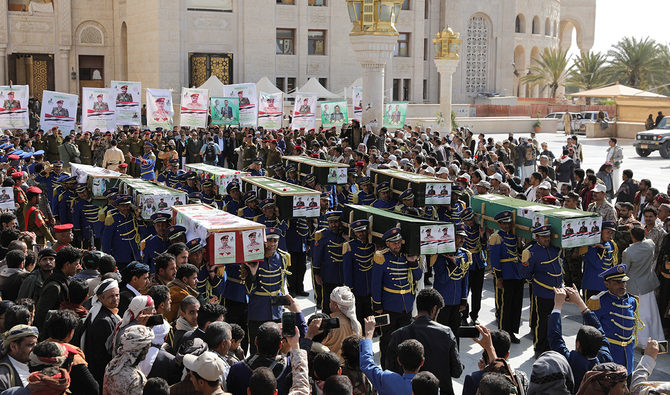AL-MUKALLA: The Yemeni army has urged the International Committee of the Red Cross (ICRC) to help retrieve the bodies of Houthi fighters abandoned on battlefields in the central province of Marib and the northern province of Jouf.
Military spokesman Abdu Abdullah Majili told Arab News on Tuesday that dozens of corpses of Houthi fighters have been left in conflict zones in Jouf and Marib as the Iran-backed militia presses ahead with a major offensive to recapture the oil and gas-rich city of Marib.
“We demand the International Committee of the Red Cross mount pressure on the Houthis to retrieve the bodies of their dead fighters. The bodies are scattered in mountains and deserts of Marib and Jouf,” Majili said.
Army soldiers and tribesmen battling the rebels in two provinces warned of the spread of disease among combatants as dozens of abandoned bodies were left to rot.
“Serwah is the worst front in terms of health. The attacks of mosquitoes and flies are more intense than the attacks of the Houthis because of the corpses of the Houthi militia,” Mohammed, an army soldier in Marib, said on Twitter.
Responding to the army’s demands, the ICRC office in Sanaa said it has not received an official request from warring factions in Yemen to retrieve bodies of dead fighters, adding that a halt to hostilities would be necessary before any evacuation could take place.
“Once we receive an official request by concerned parties to the conflict, we are ready to support such an initiative provided that all parties to the conflict provide the necessary security guarantees that will allow this mission to be carried out by the ICRC and Yemen Red Crescent Society (YRCS),” Basheer Omar, ICRC spokesperson in Yemen, told Arab News on Tuesday.
Fighting raged on Tuesday on main battlefields in Marib and Jouf as the Yemeni army and allied tribesmen, backed by massive air support and military logistics from the Arab coalition, fought off relentless attacks by the Houthis who sought to advance toward Marib city, the Yemeni government’s last bastion in the northern part of the country.
Majili said that hundreds of rebel fighters have been killed since earlier this month when the Houthis resumed a major offensive to seize control of Marib.
“What I can tell you is that the national army and the tribesmen have pushed back the Houthi militia’s attacks in Marib and Jouf and inflicted heavy defeats on them,” he said.
Tuesday’s fighting focused on mountainous areas in Serwah, Al-Makhdra, Murad, Al-Karsara to the west and north of Marib city, and in Al-Khanjer, Al-Aqsha and Al-Duhydha in the province of Jouf.
In the Houthi-controlled areas in northern Yemen, militia leaders continue to call for financial support and mobilization of young people for the offensive on Marib, claiming that the aim is to seize gas and oil facilities.
At a meeting with supporters in the province of Dhamar, Mohammed Al-Bukhaiti, a Houthi leader, said the movement declared “jihad” against government forces in Marib to recapture oil and gas fields, and break an embargo on their territories.
At the same time, local and international aid bodies said that thousands of people have been forced from their homes in Marib during the latest surge in fighting in the province.
The International Organization for Migration (IOM) said that more than 8,000 people have been displaced in recent weeks, adding that 14 displacement sites that host 30,000 displaced people in Serwah district have been affected by the raging fighting.
“Displacement sites should be refuges. All civilians, including displaced people, must be afforded protection from the fighting. The local community in Marib has long welcomed vulnerable displaced people, but today the situation is far beyond something they can manage alone,” John McCue, the IOM’s deputy chief of mission, in Yemen said in a statement.
The government’s Executive Unit for IDPs Camps said the fighting in Marib had led to the displacement of 12,005 people from different camps in the province from Feb. 6 to 21.




























